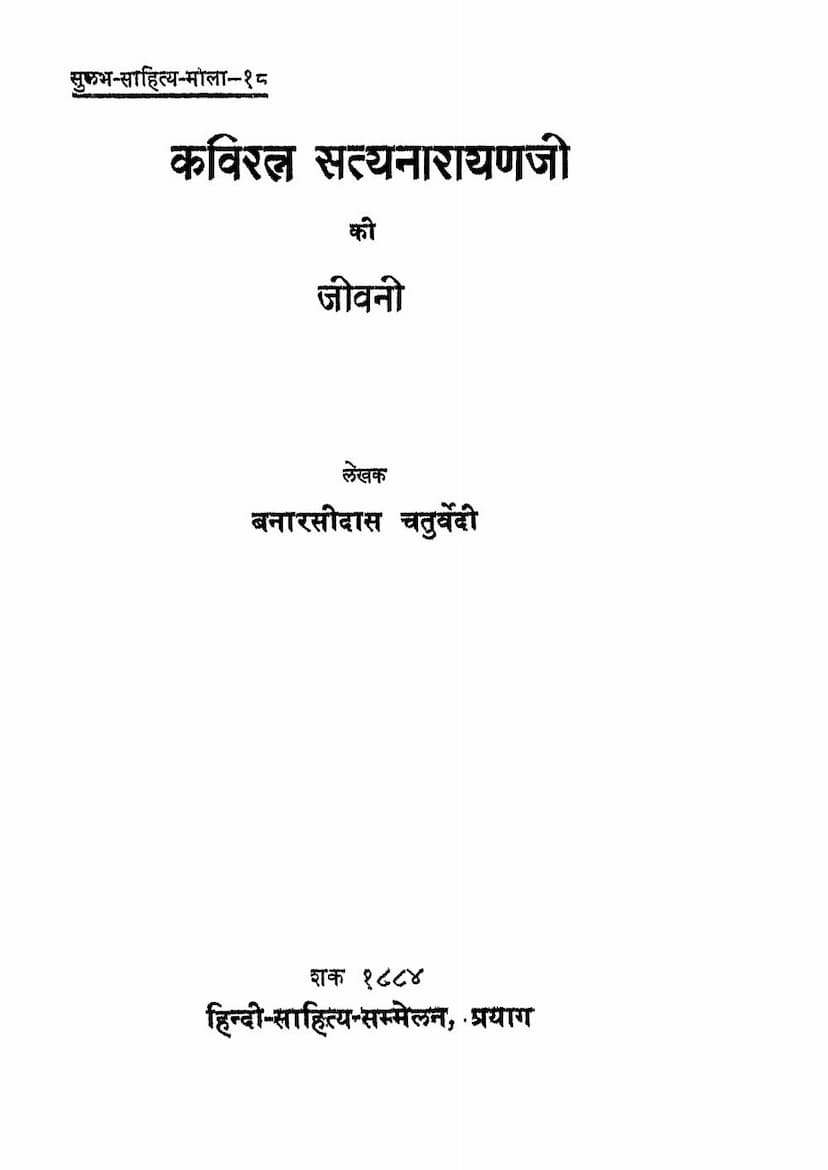Kaviratna Satyanarayanji Ki Jivni
Added to library: September 2, 2025

Summary
The book "Kaviratna Satyanarayanji ki Jivni" (The Biography of Kaviratna Satyanarayanji) by Banarsidas Chaturvedi, published by Hindi Sahitya Sammelan Prayag, is a comprehensive account of the life and work of the poet Pandit Satyanarayan, also known as Kaviratna.
Here's a summary of the key aspects covered in the book:
Introduction and Purpose:
- The book is dedicated to Bharat-Bhakta C.A. Andrews on his 51st birthday.
- It is published by the Hindi Sahitya Sammelan Prayag, funded by a grant from Maharaja Sir Sayajirao Gaekwad of Baroda.
- The publisher acknowledges the delayed reprinting of the book after the first edition sold out, attributing it to the loss of original materials.
- The book aims to present an inspiring account of Kaviratna Satyanarayanji, highlighting his contributions to Brajbhasha and Hindi literature.
Poet Kaviratna Satyanarayanji:
- Satyanarayanji was a gifted poet, known for the sweetness of his voice and the simplicity of his nature.
- His poetry is considered a significant contribution to modern Brajbhasha poetry.
- He passed away at a young age (38 years), born on February 24, 1880, and died on April 15, 1918.
- Despite his short life, he enriched Hindi literature through his translations and original works.
Early Life and Education:
- Born in Saryara village, Aligarh district, to a poor Brahmin family.
- His mother, Talfo (later Rani Sardarkunwar), faced hardships after her husband's death and her subsequent legal battles.
- Satyanarayan was raised in the care of Baba Raghuwardas, a temple priest with a love for literature.
- His childhood was marked by simplicity, a love for nature, and a playful interaction with village children.
- He showed an early inclination towards poetry, memorizing verses and engaging in playful poetic compositions.
- His educational journey included studies in Hindi and then English. He passed his Entrance and F.A. examinations but failed his B.A. examination, often due to his dedication to poetry.
- His student life was influenced by the socio-religious and political currents of Agra, including the Arya Samaj vs. Sanatan Dharma debates and the Swadeshi movement, which reflected in his patriotic and devotional poems.
Literary Contributions:
- Translations:
- Uttar Ramcharit: A Hindi verse translation of Bhavabhuti's Sanskrit play, highly praised for its lyrical quality and successful rendering of the Karuna (pathos) rasa.
- Deshbhakt Horatius: A translation of Lord Macaulay's "Lays of Ancient Rome," celebrated for its patriotic themes and powerful imagery.
- Malati-Madhav: A Hindi verse translation of Bhavabhuti's play, completed with the help of a manuscript found in Bharat Bhavan, Firozabad.
- Original Works:
- Hriday Tarang: A collection of his miscellaneous poems. Unfortunately, the original manuscript was lost, though parts were later recovered and published.
- His poetry often reflected his personal life, his deep love for Braj and Brajbhasha, his patriotism, and his spiritual leanings.
Personal Life and Character:
- Simplicity and Humility: Satyanarayanji was known for his profound simplicity, humility, and guileless nature, which sometimes led to him being taken advantage of.
- Poetic Nature: His life itself was described as poetic; everything he did, from speaking to laughing, was imbued with a poetic quality.
- Devotion: He was a devout Krishna devotee and found solace and inspiration in spiritual pursuits. His admiration for Swami Ramtirtha was particularly notable.
- Love for Brajbhasha: He was a staunch advocate for Brajbhasha, composing many poems in it and lamenting its decline.
- Patriotism: He actively participated in the national movements of his time through his poetry, writing poems on Swadeshi, the Hindu University, the Kamagatamaroo incident, and in praise of national leaders like Lala Lajpat Rai, Pt. Madan Mohan Malviya, Mahatma Gandhi, and Lokmanya Tilak.
- Marriage and Home Life: His marriage to Savitri Devi was not a happy one, marked by discord and his wife's desire to live separately. His personal struggles and the lack of understanding in his domestic life deeply affected him and are reflected in some of his poignant poems.
- Illness and Death: He suffered from chronic asthma and tuberculosis, which significantly impacted his health. Despite his illness, he continued to write. He died on April 15, 1918, at the age of 38, a tragic loss for the literary world.
Key Themes and Anecdotes:
- Influence of the times: The book highlights how the social and political environment of Agra influenced Satyanarayan's poetry.
- Interactions with prominent figures: The biography recounts his meetings and exchanges with various literary and spiritual personalities, including Acharya Mahavir Prasad Dwivedi, Pt. Shridhar Pathak, Swami Ramtirtha, Rabindranath Tagore, and Mahatma Gandhi.
- The enduring appeal of his poetry: Despite his short life and personal struggles, his poems, particularly those in Brajbhasha, continued to resonate with readers and fellow poets, leaving a lasting legacy.
- The author's perspective: Banarsidas Chaturvedi expresses his deep admiration and affection for Satyanarayan, acknowledging his own potential bias due to their friendship. He emphasizes the importance of Kaviratna's contributions and the need for his work to be remembered and preserved.
In essence, the book is a tribute to a poet who, despite facing personal adversity and living a short life, left an indelible mark on Hindi and Brajbhasha literature through his simple, sincere, and patriotic verses. It paints a vivid picture of a sensitive soul deeply connected to his language, his country, and his spiritual beliefs.